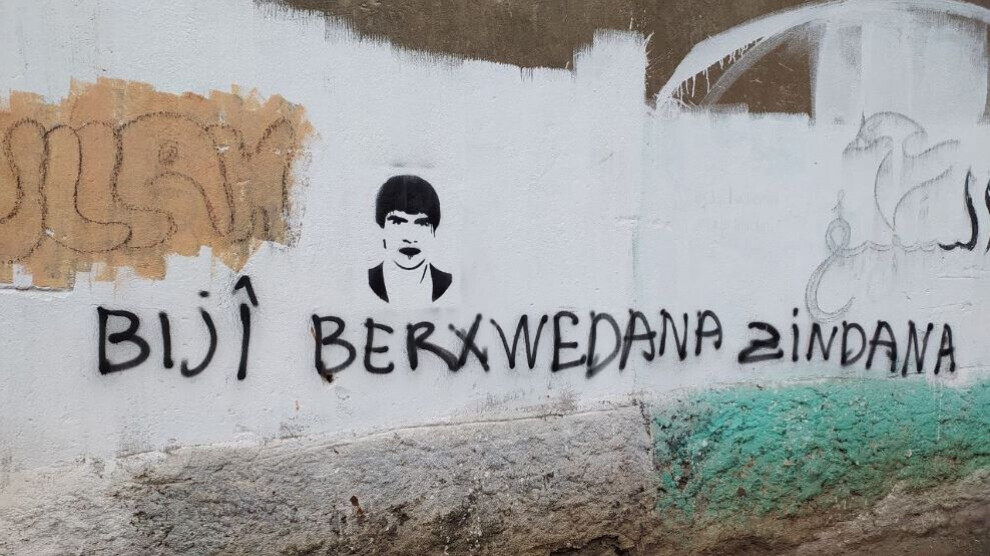Deniz Kaya: "Only resistance leads to victory"
39 years ago, the great death fast began in the Amed dungeon, through which the political prisoners refused to surrender. This struggle continues today, and the hunger strike is being extended.
39 years ago, the great death fast began in the Amed dungeon, through which the political prisoners refused to surrender. This struggle continues today, and the hunger strike is being extended.

On July 14, 1982, under the leadership of PKK members Kemal Pir, Mehmet Hayri Durmuş, Akif Yılmaz and Ali Çiçek, a death fast was called in Amed (tr. Diyarbakir) prison, demanding an end to torture, military discipline and uniform clothing. This action is considered the first spark of resistance after the 1980 military coup, not only denouncing conditions in prisons, but also sending a revolutionary signal to people outside the prison walls to incite the masses to fight against Turkey's oppressive regime. 55 days after the death fast began, PKK cadre Kemal Pir lost his life at the age of 20. To this day, he is honored as the embodiment of the movement's radical and internationalist spirit and as a bridge between the struggles of Turkish and Kurdish people. Mehmet Hayri Durmuş, Ali Çiçek and Akif Yılmaz also died in the course of the action. As a result of the resistance, the era of Esat Oktay Yıldıran, the senior officer of the prison whose name was synonymous with torture and who had been spat in the face by the murdered revolutionary Sakine Cansız, also ended. The death fast is called the "Great Resistance of July 14" by the PKK.
On this historic date, 39 years later, Deniz Kaya has issued a statement on behalf of PKK and PAJK prisoners in Turkey. He praises the struggle of Kemal Pir, Hayri Durmuş, Akif Yılmaz and Ali Çiçek as a successful resistance to the torture used to force the prisoners to surrender and deprive the Kurdish people of their dignity. The enemy did not succeed in this at the time, writes Deniz Kaya. The same fascist mindset still prevails today. The political prisoners are particularly affected, but the entire Kurdish people are meant.
"The operations in Rojava and South Kurdistan aiming at occupation have the purpose of triggering intra-Kurdish conflicts and not allowing the Kurds a living space. What has happened in Iraq after ISIS and the new connection that has emerged between our people and the Kurdish liberation movement are an indication that the old order cannot continue. Neither the fascist AKP/MHP mentality nor their local collaborators can change that. They will be left footing the bill."
In Kurdish history, there have always been collaborators and resistance. The KDP is relying on its family tribal interests and insisting on the past despite the developments that have taken place, according to the statement on behalf of the PKK and PAJK prisoners. If the ruling party of South Kurdistan continues its relations with the colonial power regardless of all ethical standards, it is exposing itself to destruction: "Our people in the South (of Kurdistan) have made it clear with statements, actions and activities that they will not accept this anymore. The KDP must abandon this way of thinking and acting and understand that national unity is indispensable."
"No respect for human dignity"
Turkey's current situation reflects the unsuccessfulness of the one-man regime, Deniz Kaya continues. It is no longer of any use to the regime to blame the pandemic for the economic crisis. No one can have expectations of a state that has degenerated into a mafia. In the offensive launched by the Kurdish liberation movement, "End isolation, fascism and occupation, time for freedom," the continuity of the struggle is above all important.
"The policies of a hundred years ago are still valid today. Governments within the Turkish state tradition may change, but the policy continues unchanged. When it comes to the Kurdish liberation movement, power struggles are left aside. 39 years ago, the junta under Kenan Evren tried to force the prisoners in Amed to surrender and betray. The AKP/MHP government is doing the same today. Every day, new amendment packages are passed, imposing surrender on the prisoners under the term 'good behavior'. An isolation policy is being implemented inside the prisons. There is no longer any respect for human dignity. Prisoners are monitored with cameras, and telephone conversations with relatives are tapped. Sick prisoners are left to die. They are confronted with a procedure that does not even occur in enemy criminal law. Most recently, our companion Huseyin Idiğ passed away in the hospital after wrestling with his illnesses in prison for 26 years and was released at the last moment. Our Apê Dedo [Mehmet Emin Özkan] has been in prison for 25 years and is seriously ill. At the age of 83, he is no longer able to walk on his own and is not released from prison because of an alleged risk of escape."
The prisons are a reflection of the state of society brought about by the AKP/MHP government, writes Deniz Kaya, pointing to the decades of prison resistance: "The conviction and attitude of our party and our people will make the dirty politics of the enemy fail." According to Kaya, the hunger strike, which began on November 27 in five-day rotation, will be carried out in 15-day rotation starting today. "We call on all our people and all those who live here and call themselves human beings for increased attention against oppression and for an end to isolation. The only way to victory is through resistance," Deniz Kaya said on behalf of PKK and PAJK prisoners in Turkey.